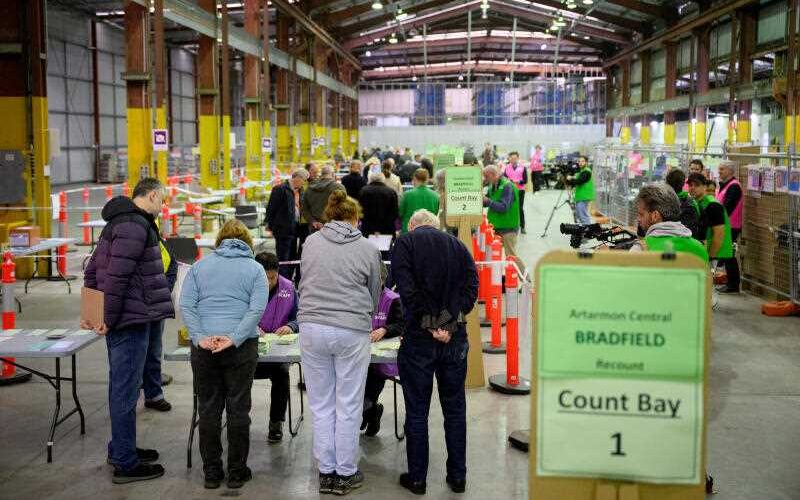The Federal election delivered a resounding defeat for the Liberal Party, topped off by the defeat of Peter Dutton, and the ultra-marginal loss of Bradfield. Musician and author Michael Buining watched that vote count unfold.
The Liberal Party count challenge notwithstanding, Bradfield was won on the slimmest of margins by independent Nicolette Boele. The Libs had held the seat of Bradfield on Sydney’s leafy North Snore (sorry) for 75 years, and for many years it was one of their bluest of blue-ribbon seats.
In the previous election, the sitting member, Paul Fletcher, was challenged by “Teal” Boele, who closed the gap so that in 2025 Fletcher knew he was under serious threat, holding the seat by only a 2%-3% margin.
Fletcher’s response? He ran away and hospital-passed the seat to Gisele Kapterian. Nothing like treating women like the option of last resort!
I’d lived in Bradfield for most of my life and had never imagined the possibility of such a close election, and I didn’t want to sit on the sidelines. So over the course of six months, from January 2025 and into July 2025, I got on board the rollercoaster, which quickly became an eye-opening social experiment about grassroots political culture and the truly bizarre world of Australian Electoral Commission vote counting.
But where to start?
Social media campaigning
First up was the social media circus: Posting things that mocked the Liberal Party.
Soon enough, I was seeing the lack of self-awareness within the Liberals’ ranks that prevented them from laughing at themselves.
I joked that Trump was going to introduce 150% tariffs on Australian potatoes and that Dutton was in panic mode. Some people thought it was real, and how dare I make fun of Dutton’s alopecia? I did point out that it was serious issue for him as given he was worth $300m he’d face a personal bill of $450m every time he visited Trump. Oops.
I posted a photo of a nuclear power station in Ku-ring-gai National Park, saying that it would not only deliver cheaper power but also make our houses more affordable! Some people also thought that was real and that I was an idiot for not understanding their policies properly.
A photo of the Big Potato down in Robertson in the Southern Highlands, decorated as a pig to celebrate the 40th anniversary of the film “Babe” with the line that “Dutton was spotted campaigning undercover down in Robertson”, was met with how I was some woke-left-wing-teal-idiot-stuck-in-a-bubble because Robertson was north, not south, of Sydney. The Liberal troll-er not realising Robertson, the town, not the electorate, was part of the joke. Youch.
The powerful and privileged have never enjoyed mockery. But the response to the jokes, the satire, the parody was much more than “that’s not funny, mate”. It was anger that was revealed in personal attacks. It was the tip of the cultural iceberg that was sinking the Liberals’ ship.
Volunteering
In April, it was time to get a bit more serious, so next step was volunteering. Standing at pre-polling booths, door knocking, attending rallies and handing out voting cards on polling day. I’d never done any of that and never envisaged that I would but it was equally as eye-opening as the social media circus.
The bozos, the bullies, and, of course, the Brethren had emerged and, along with that, the grassroots culture of the Liberals blossomed.
I’m sure at the heart of all political parties, there’s a hard core that could have similar issues. But for the Liberals, their anger, sense of entitlement, and lack of self-awareness were the images in the mirror they didn’t want to face. And their policies, declining membership and lack of elected women representatives are a symptom of that culture.
Eventually came the Big Day and the next level eye-opening experience: Five weeks of scrutineering.
Watching the AEC count thousands upon thousands of ballots and picking out which ones to challenge and witnessing, first hand: Boele’s lead over Kapterian narrow from an election night lead of 1,600 votes to just 40 votes (as the inevitable postals arrived); then seeing that reverse to minus eight (after the full distribution of preferences was done); and then finally seeing that reverse yet again to +26 (after the final count), was a serious rollercoaster.
Vote counting peculiarities
The vote counting process is not well understood at all.
It’s very thorough and very rigorous, but there are basic misunderstandings. The “recount” isn’t a recount as we all think. The votes have already been counted, and they are counted again, but it’s more like recounting the kids on a school excursion once they’re already on the bus as opposed to kicking them all out onto the footpath and then getting them to come back on board.
It’s a re-examination of a previous count, not a new one from scratch.
That’s a subtle, but important, difference because when the Liberal Party, in their statements, say the AEC “created two conflicting results”, which is not true.
The AEC did one count, which had Boele ahead by 40. Then they checked it, by looking at preferences more closely, which resulted in Kapterian being ahead by eight. And then they checked it again, this time looking at the primary votes more closely, resulting in Boele being ahead by 26. It’s not creating a conflicting result; it’s checking the previous count to make it more robust, and that’s what explains those swings.
Time to go digital?
In this day and age, it’s time to dump the pencils and paper, the protractors and magnifying glasses and go electronic. Either that or introduce National Calligraphy Classes.
Handwriting is extraordinarily subjective at the fringes, and the Liberals do have a point in contesting the interpretation of votes, as was done back in 2007 in the seat of McEwen, where a similar thing happened.
Back then, Rob Mitchell (ALP) was ahead by six votes after the first count, and then Fran Bailey (Lib) pulled ahead by twelve after the recount. It went to the court of Disputed Returns, and the Judged personally checked 634 votes, deciding the matter “on merit”, with Bailey’s lead increased to 27. So, we’ve been here before.
But it’s not just the handwriting that we’ll hear a lot more about as the dispute comes before the court. There are a few little-known quirks that don’t exactly help confidence in our electoral system.
You can’t write your name on the ballot because that identifies you and makes your vote informal. But how does the AEC know you’ve written your name and not your neighbours? Weird and obscure, but it’s there.
A far more common one is that the AEC says on the ballot: “Number ALL boxes to make sure your vote counts.”
But the truth is you don’t need to number all boxes. You can leave one blank, and it has to be totally blank. Because if it’s blank, that’s assumed to be your last preference.
But if there’s just the smallest spec of a pencil mark in that box, so it’s not completely empty: the ballot is suddenly informal.
It’s in the rules and it’s on the AEC’s website, but when a spec of a pencil in an empty box is the difference between a vote being formal and informal… I think we can do just a little bit better.
“Bradfield 2025: What Just Happened?” by Michael Buining will be available on Amazon from July 27.
A dying demographic: how Murdoch is slowly killing the Liberal Party
Michael Buining is a former finance professional, but after retiring over a decade ago is now a musician. He is also the author of "Bradfield 2025. What Just Happened?"

